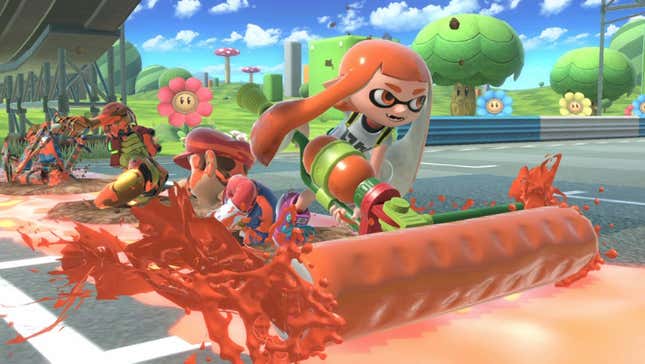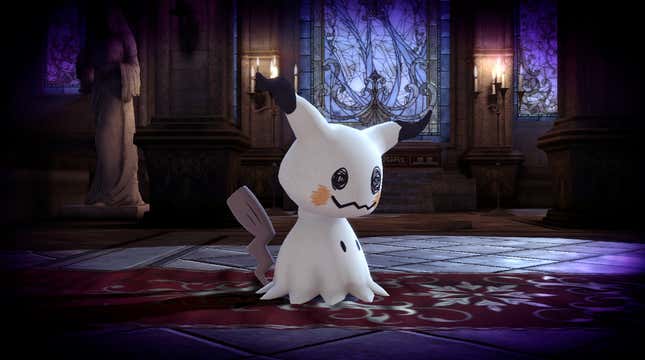
I’ve begun to think of my weekly, local Super Smash Bros. tournament as a sort of doctor’s appointment for my ego.
Regulars tell me that it’s normal to just win one or two games at these things, yet selection bias mandates that the people who attend a lot tend to be confident that they’re really, really good or that they’re on the pathway there. The only way to learn, the wisdom goes, is to get pummeled over and over by people better than you until—through smarts or osmosis or telepathy—you identify and absorb why they win. Better yet, they might just tell you to your face.
I met a guy at one of these things whom I’ll refer to as “Inkling senpai.” He and I main the same Super Smash Bros. fighter—Splatoon’s Inkling—except he’s on another level. He always places third or fourth in the total standings, beaten only by possessed Smash players whom I assume sacrificed something to some demon.
He’s also all about feedback, always offering it in an upbeat tone with a lot of smiles and encouragement. “You need to throw an ink bomb every time your opponent is off-stage,” he told me once. “You’re not adapting; you’re being predictable.” Once, he said, “I downloaded you.”
I graciously accept Inkling senpai’s feedback and do my best to hold it in the top of my mind even while, on the ground floor of my brain, my impulses are firing off faster than I can consciously keep track. Slowly, I honed my back-airs and edge-guarding until my toolkit became more menacing. I’ll fling an ink bomb off-stage and, sometimes, it’ll knock the opponent into the ether, earning me a win. Last night, I placed fourth.
In my experience, competitive gaming meetups are one of the only venues where people (complete strangers, even) give each other clear, cut-and-dried feedback. Not just the basics like “you suck” or “great job”—thoughtful analyses of what you’re doing and whether it’s getting you where you want to be. In other situations in life, people might not give it to you straight. If you really flubbed your lines in the school play, your parents might say that it wasn’t even noticeable. When your going-out outfit is too much, your friends might laugh, telling you, “What a look!”
I’ll never forget when, at my first Magic: The Gathering tournament, an opponent who had just beaten me meticulously and tonelessly pointed out every single bad move I made before taking my deck in his hand and pulling out the cards he thought weren’t helping. At first, I was offended, sorting some of them back into my deck. That’s not a normal thing to do, I thought, even though he clearly meant no harm. Then, as I moved to sit across from my next opponent, I remembered some of his advice—leaving my mana untapped until after the attack phase—and ended up beguiling this new challenger into my first win. It’s hard to say whether the stranger was right to offer unsolicited feedback, but it’s arguable that, just by entering the tournament space, he and I shared the same goal of improving. In the end, I left the hobby shop that day with a score that made me proud.

Rare are the circumstances where nearly everybody in a given room is there to grow, sincerely and whole-heartedly. It’s like living through a montage training scene in a shonen anime, but real life includes all the mundane feedback that the video editing skips over. You have to put aside your ego, and so does whoever’s offering counsel. Feedback can be as toneless as your doctor checking your blood pressure, as thoughtful as your best friend telling you that going blonde would clash with your wardrobe.
Then I log onto Overwatch, a separate realm where unsolicited feedback is king, despite the fact that few people can accurately pinpoint why their team lost. Most of the feedback isn’t helpful, or isn’t coming from a place where that matters. It’s a team-based first-person shooter, so players don’t always have a great vantage point on what their teammates are doing. And because it’s six versus six, a player might not die because they suck; it could be that their healer wasn’t healing well enough, that their tank wasn’t adequately positioned, that their damage-dealer wasn’t taking down their targets. On top of this, Overwatch is an online game. Anonymously and physically distant, players can be needlessly rude without having to see their teammates’ crestfallen faces. Regularly, I hear players elevating “blunt feedback” onto the level of straight-up harassment.
Prescribing rules around feedback is tricky, since it depends on a given person’s tolerance for criticism and personal gaming goals. (Competing online as opposed to in-person, however, does seem to make a difference from an empathy standpoint.) There’s a way to do it with love that makes your gaming community more supportive and more powerful. There’s also a way to do it spitefully, with an overtone of superiority and abuse.
For me, the sweet catharsis of knowing what I did wrong fills my losses with purpose. Just make sure to ask me if I want to know first.